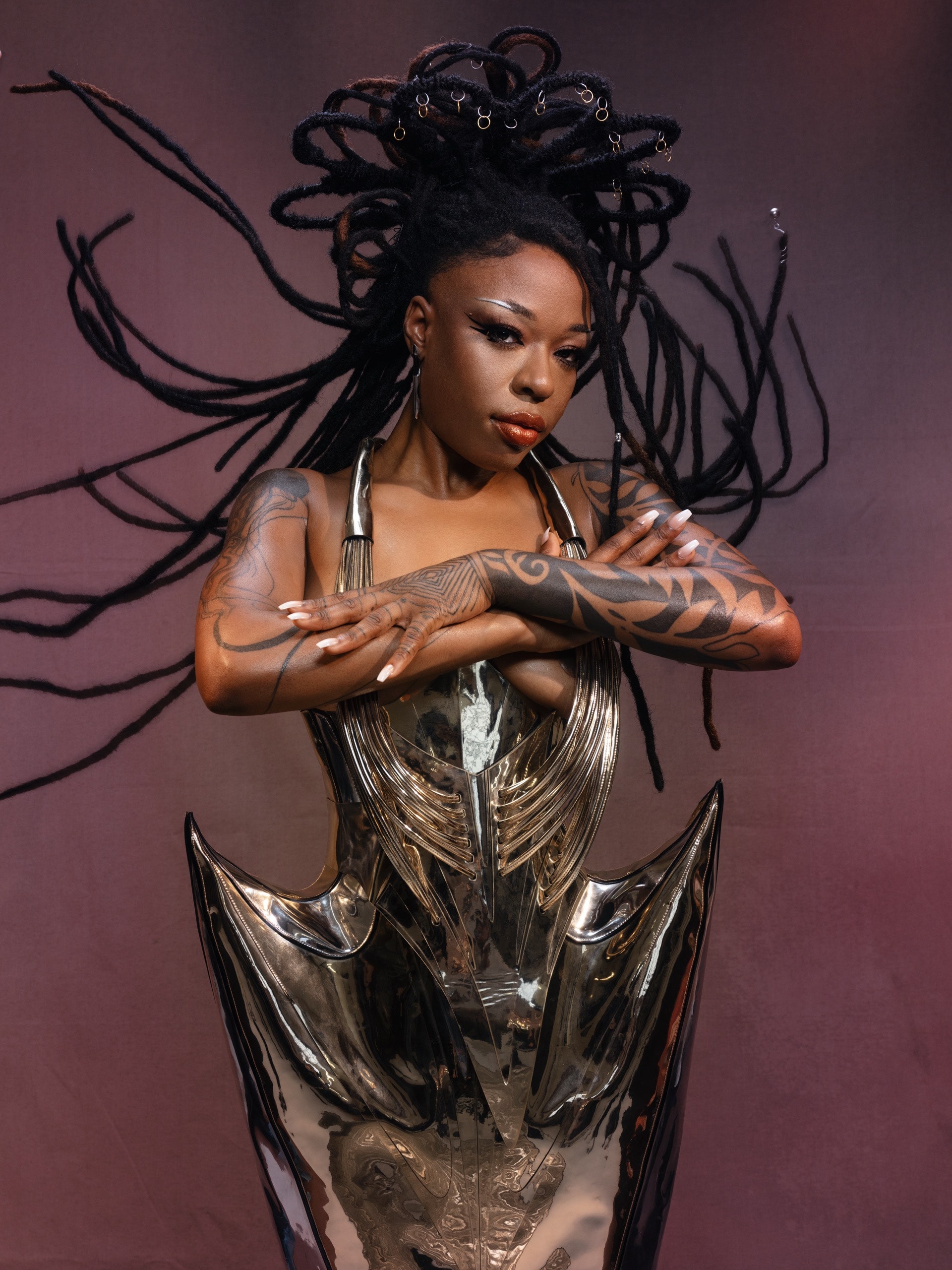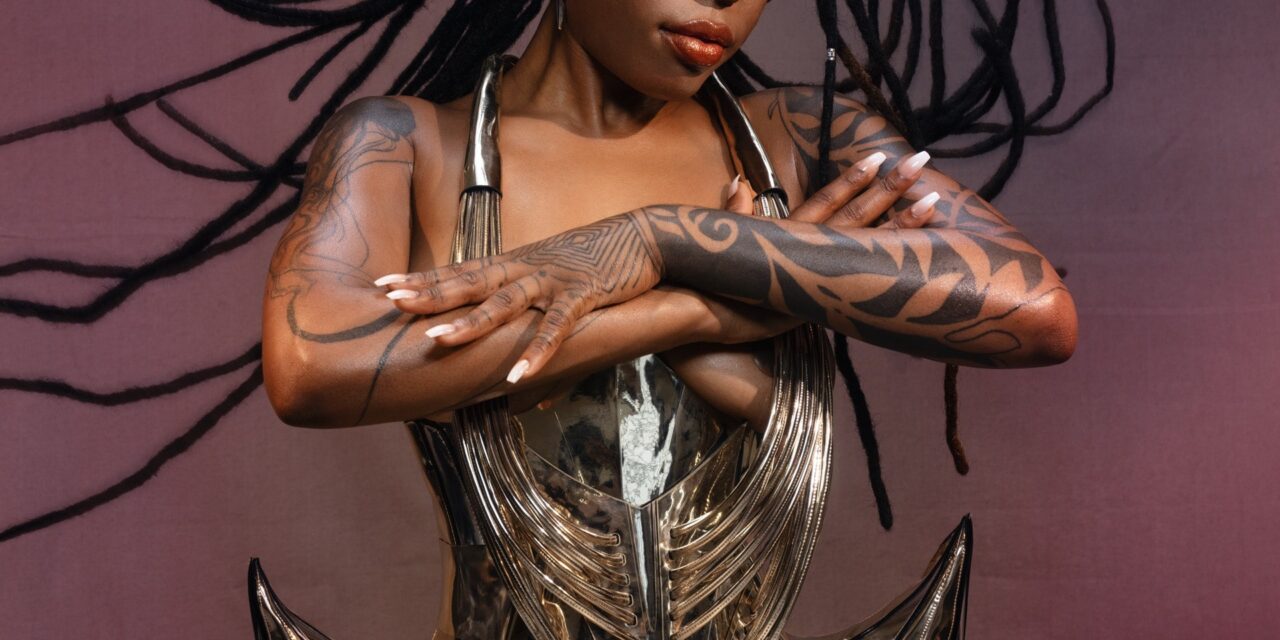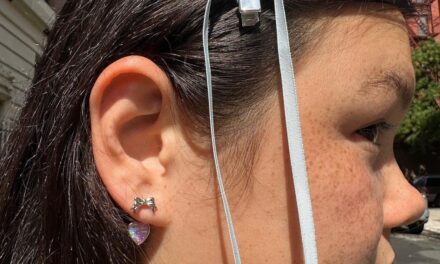How Sudan Archives Became the Violin’s Domme

“Do you listen to Sudan Archives?” Most of the time, but not every time, the response to this question is one of confusion. How can one listen to the archives of a country? Sudan Archives is, in fact, a twenty-nine-year-old musician—a singer, rapper, producer, arranger, lyricist, and violinist. She creates a “fiddle-punk sound,” as she describes it, that blends folk, ambient, soul, house, and whatever other tradition she feels is available for the taking. Sudan (the name that her colleagues, her fans, and, increasingly, her intimates call her) begins composing by striking a riff on one of her five violins, which she uses differently from most other American producers. A balladeer trots out the strings, like a show dog, to heighten the atmosphere of desperation in songs that are meant to be performed by destroyed women and repentant men. Sudan pursues technical, rather than emotional, manipulation. She is the violin’s domme. The songs creep into existence in her basement studio, where the two of them can be alone. A D.I.Y. queen, Sudan will pump a riff into her digital-production program to deconstruct it. She can coax from the violin the sounds of an accordion, a guitar, a drum. A string orchestra. “I can perform my song live and have twenty violins,” she explained. “And they’re all me.”
“She reminds me of Kanye West, except she’s a woman and a violinist,” one of Sudan’s collaborators said recently. Sudan, too, wants to be a provocateur; when we spoke, she balked at the idea of performing in an orchestra, where she’d be expected to play “slavery songs.” For much of her six-year public career, which has taken place in the indie/alternative music world, she has made herself the reputational custodian of her misunderstood workmate. For her real and imagined audience of overly Westernized listeners, Sudan has developed a motto: “In so many places in the world, the violin brings the party.” It is the fiddle, she corrects—the preferred instrument of the underclass.
The artist, whose government name is Brittney Denise Parks, was born in Cincinnati, Ohio, not in Sudan. Her music and her performance borrow from the style of Sudanese fiddlers whom she found on YouTube, the “archives” in question. Sudan is the American who enthusiastically joins the diaspora through a kind of awed rechristening. Like those Sudanese fiddlers, who dance and sing as they play, she does not stand still when she performs. She has used choreography inspired by video games: twirling her bow as if it were a sword or a snake (she has one, named Goldie), as if she were a charmer, or a warrior. Lately, she has equipped herself with a studded quiver, drawing her bow like an archer. She uses tech that allows her to go completely wireless onstage. (“What else is prohibiting me from being wild?” she recalls thinking.) Her violin now dangles from her, and when she grasps it to play she treats it as an extension of her erotic self.
While opening for the musician Caroline Polachek, on a recent tour, Sudan occasionally came on during the headliner’s set for a blink-and-you-miss-it solo. She would enter stage left, dressed in pleated leather, and gradually slide onto her knees. (Like Hendrix, she said.) She has considered using a shock-white Viper, an electric violin modelled on the guitar, which is associated with heavy-metal white guys. “It could be corny,” Sudan said. “But I’m going to make it sexy.”
Sudan has called herself “a visual artist who just happens to make music.” Her material is her body. She has personas, who have put on and slipped out of many different types of Black drag. Early on, Sudan wore flowing cotton dresses and kente skirts, exuding an aura of Earth Mother sobriety. For her first album, “Athena,” from 2019, she became the picture of the arch Afropunk, who, with her black lipstick and her sculptural, green-tinged braids, emitted a different kind of seriousness. She abstracted her strings, filling the atmosphere with synths, stoking a feeling of psychedelia. For “Natural Brown Prom Queen,” her second album, which she released last year, Sudan created her best persona: a character called Britt, who seems not to be a character at all but, rather, “the girl next door from Cincinnati who drives around the city with the top down and shows up to high-school prom in a pink furry bikini with a thong hanging out of her denim skirt,” to quote a press release.
“Natural Brown Prom Queen” is an anthem album. You sing along to it. The music surprised Sudan’s fans, in part because it felt like R. & B. The artist had expressed, in earlier interviews, that she could not bear the idea of “Oh, a Black girl, let’s put her in R. & B. or soul.” None of that sweaty-brow, glory-to-god belting from this singer, who hardly calls herself a singer. Like her peer experimentalists—FKA twigs, Kelsey Lu, and L’Rain come to mind—Sudan’s presentation (her stylist, Michael Umesi, calls it “Nubian Pünk”) sparks anxiety and excitement about her “difference.” She must be new, which means alone, because Black girls don’t normally present like that, vocalize like that. No other segment of the artist population is as stalked by ideas of how they should be. The notion of an “alt-Blackness” affirms the femmes and queer people, the marginalized among the marginalized, though the affirmation can have a flattening effect. “Natural Brown Prom Queen” is a key work because it does away with the binary for that millennial cohort. The artist says: I’m a trickster because I’m like my predecessors, not in spite of them.
Critics, Black and white, have pored over Sudan’s body of work, and over her body—more precisely, the ever-evolving image she has put forth of her Blackness, as she has become less aesthetically reliant on the shock of the muscular Black girl “brandishing” a violin. The Guardian described “Athena” as “some of the most viscerally gorgeous music put to record” in 2019, and Pitchfork listed “Natural Brown Prom Queen” as the second-best album of 2022, right behind Beyoncé’s “Renaissance.” There is a sense, in all the triumphant writing about Sudan, the reviews and essays where the aforementioned praise and other self-consciously “fierce” vocabulary spill over, that the critics feel they are working in tandem with the musician on an intellectual project. One review, by a Black writer, found continuity between “The Bluest Eye”—Toni Morrison’s novel about how self-loathing takes root in the fractured heart of the little Black girl—and the title track of Sudan’s second album. On the one hand, noticing (or even manufacturing) resonance among works across time is what we critics have to offer. The reviewer’s analysis could not have been sounder. But, when I asked Sudan about it, she bristled and said, “When people think of me as an artist, it feels so”—she raised her fingers in air quotes—“ ‘Black historical.’ I’m not doing it on purpose.” Sudan, critically beloved but still in the process of being discovered, does not want her champions to eternally consist of those who are in the know.
“Sometimes I feel like a certain type of Black people don’t like my music,” Sudan told me, matter-of-factly. “Natural Brown Prom Queen” seems to stem from a worry that her alt presentation has turned off lovers of mainstream Black American style. The woman who had made herself haughty and celestial on “Athena” came earthbound, and was talking about Chevy S10s on soundscapes that paid homage to the innovators of Detroit and Chicago, the Black home towns of her Black parents. Sudan, who, in her stage name, sheds Americanness, told me that she wants to be seen as a “bad bitch.” That idea of “badness” comes from the funk aesthetic—think of the sexual and musical authority of Betty Davis.
Sudan had resigned herself, as many touring artists have, to looking out at a white sea. But last year she performed at Hood Rave, a party for Black queer people in Los Angeles. She wondered if some Black audiences just hadn’t encountered her yet, if she should maybe play more shows in the hood, and expose them to her music. “I’m going to make them like it,” she said.
It was mid-spring, Coachella season. Sudan was preparing for her show in the desert, her second time performing at the music festival. During a rehearsal, in Burbank, I watched Sudan become her performance self. Sudan was initially a one-woman show. Lately, though, she has invited support musicians, including other violinists, to join her onstage. The musicians are always Black, and, more often than not, the violinists are Black women, creating a visual rejoinder to the myth that she is the only one.
That day in Burbank, Sudan was playing with a number of musicians, including another violinist and singer-songwriter, Prax Zxari, who had trained at the Berklee College of Music. Zxari wore an oversized sweatshirt, a green corset, a long denim skirt, and white boots. She stood erect as a bamboo shoot, violin tucked under her chin. Her eyes were trained on Sudan, who was dressed in exercisewear: she had wrapped her heavy locs in a blue bandanna and thrown a tennis skirt over her unitard, the waistband slung low enough to make it known that the unitard tapered off into a thong. Sudan had told her players not to worry about stage presence during the rehearsal, but as they practiced she swept the floor, extending her legs and shaking her ass, remembering to dart her almond eyes from her violin to the invisible camera, for which she vamped.
At one point, the only person who seemed to exist for Sudan was Zxari. The musicians were practicing the flourish on “Homesick (Gorgeous and Arrogant),” from “Natural Brown Prom Queen.” The song is narrated by a lovesick Sudan; the echoing appellations for sex (“I just want the D-I-C-K”) are softened by the violin, which Sudan plays adagio, until she quickens, punctuating the riff with two bars that feel like tripping and skidding down a hill.
Sudan drew closer to Zxari. She circled around the other violinist, lowering her own violin, at times, to her pelvis. “Too orchestra,” she told Zxari, gently. Zxari played more expressively. But the players were not yet in synch.
Sudan, who has been playing the violin since she was nine or ten, is self-taught. She plays by ear. Through the years, she has sporadically worked with teachers, and has made and abandoned efforts to learn sight-reading. She played the bars for Zxari, slower. It went on like this, back and forth, until someone produced sheet music for Zxari.
With the notation learned, both players relaxed—and they moved on to the choreography. Sudan stood back-to-back with Zxari and reached her hand above her head, like a flamenco dancer. They turned to the imaginary audience, Janus-headed. “I want it to be like we’re twins,” Sudan said, grinning widely.
The rehearsal continued. The music director informed everyone that he would be feeding a robotic voice into their headsets which would announce what was next on the set list. “One day, can we customize it and have it be some ghetto-ass shit, like ‘Output one’?” Sudan asked, in an exaggerated voice. “I low-key wanna do it.” With Sudan, “ghetto” is a word that comes up often. To her, it means “natural.” Her “ghettoness,” she has felt, is underrepresented. As she pushes her sound and her lyrics, she foregrounds a sense of play while under persecution, to provoke a stronger emotional identification with Black-girl listeners. Sudan is a sentimentalist, and her lyrical world is devoted to exploring the inner lives of girls like her: escapists of gender and race norms who, being free, occasionally yearn for the old expectations. The song that stands out on “Natural Brown Prom Queen” is a screamer called “OMG Britt.” As a singer, Sudan sometimes embodies the parlando method: vocalizing that occupies the limbo between speech and song. On “OMG Britt,” where she boasts, “I never trap alone / I always go in pairs,” her delivery, crazed and funny, is beyond rapping. Her energy threatens the thudding trap bass line. The music video is a re-creation of Michael and Janet Jackson’s “Scream” spectacle; Sudan smashes a violin, the first she ever owned, a dissipation of the shadow of respectability that always lurks.
In “Glorious,” arguably Sudan’s finest lyric achievement, from “Athena,” the artist gives glimpses of her family history: “Teacher’s smile on my father’s face / Poppa got a new job today / Momma smiles at your door / Feels so close, yet so far away.” Sudan Archives comes from “educated middle-class Black folk,” according to her mother, Cheryl, who works as a compliance officer at a jewelry firm in Cincinnati. Cheryl met her first husband, Reginald Parks, at Central State, a historically Black university in Ohio. Cheryl was reserved; Reginald, a theatre major, who used to preach and now sells cars, was wilder. The two married and had three children, first a daughter named Christina and then fraternal twins, Catherine and Brittney.
It was imperative to Cheryl that her daughters know how to move easily between the Black and white worlds. (“I was not one of those Black girls trying to date all the white boys,” Sudan told me.) The family, in search of the “best schools,” bounced around Ohio. They landed in old-money communities, dotted with Tudor Victorian homes. The Parks family were the itinerant renters. Reginald served on and off as a preacher at Church of God in Christ, the Pentecostal community. (“Talking in tongues and stuff,” Sudan said.) While living in Wyoming, Ohio, a fiddling group that played Irish jigs came to visit the kids’ school. Brittney was instantly enamored. The older white proprietor of the town’s violin shop agreed to rent her one, as her family couldn’t afford to buy. “She was jigging around the house all day,” Cheryl recalls. There was an old Casio around, which Cat and Britt often used to write songs.
Although she played in some fiddle groups in grade school, Brittney mostly honed her ability in church, which means that from the very beginning she associated the violin with the ecstatic. The family attended church three times a week. Her mother remembers her as being quiet, “a funny little girl.” She was disdainful of school, but she was smart. “If you read and talk like you got some sense,” Reginald said, “ain’t no telling where you can go. They won’t know if you Black or white.”
One night, Reginald came home high. The charismatic preacher who had struggled with an addiction to crack cocaine eighteen years earlier had relapsed. Long before this, he had also been diagnosed as having manic-depressive bipolar disorder. (“The reason I’m such a good entertainer,” Sudan said, “is because of his genetics.” ) Reginald, with his addiction, shattered the picture of nuclear-family perfection that Cheryl had worked so hard to create. When the twins were thirteen, their parents divorced, and Cheryl met Derrick Ladd, a former scout for LaFace Records, whom she then married. Ladd came into a house full of women and was very much beloved, not least because of his determination to fill what he sensed was a patriarchal void. He wanted to mold Cat and Britt, who had always loved messing around with instruments, into a girl group, which Cat named N2, because it sounded like “intuition.”
The twins got along as girls, but as they grew older differences in their personalities became entrenched. Cat was hesitant, and Britt was impulsive, though Britt said that it was her sister who first led her to think of life outside of convention—both girls chemically relaxed their hair, and it was Cat who cut off her processed hair first. Cat obeyed Ladd’s expectations, while Britt grew resistant to the girl group. Ladd had put them in artist development and hired producers to craft their sound. “Derrick said, ‘You need to make music, but you don’t need to make the music,’ ” Sudan recalls. “I do. I need to touch it.” She began blowing off rehearsal and skipping curfew and smoking weed with her boyfriend. She checked out the Cincinnati rave scene. Cheryl started calling her hippie daughter Sudan, as Brittney had never quite seemed to fit. Her mother and her stepfather gave her a gentle ultimatum: if she could not follow the rules of the home, she would have to leave. At the time, Ladd’s health was declining. “Britt knew that Cat knew how to stay and how to minister, and she could not,” Cheryl recalls. As Brittney prepared to leave Cincinnati for Los Angeles, with old-school dreams of “making it,” Ladd blessed her. Cat also left home, for Nashville, where she began a songwriting career. Several months later, Ladd died of cancer.
Sudan settled in Los Angeles with her boyfriend at the time, a popular musician whom she refused to name. She worked waitressing jobs in order to stay afloat, sometimes three at a time. And she kept in sporadic contact with Cat. “She was struggling and didn’t want us to know that,” Cat said, over the phone. (Their speaking voices are so similar that, when I called her and she picked up, I thought I had accidentally dialled Sudan.)
In Los Angeles, Sudan became Sudan. She felt a sense of divine providence, settling on her full stage name. She enrolled at Pasadena Community College, with dreams of eventually studying ethnomusicology at U.C.L.A. It wasn’t long before she dropped out of school. Talking to Sudan, you realize that she metabolized her family’s zeal for education into her autodidacticism. She is studious, but her learning is guided by tunnel vision, resulting in a curriculum of her own obsessions. The “Athena” album, for example, takes its concept from Martin Bernal’s “Black Athena,” a text about the Afro-Asiatic roots of classical civilization.
In Los Angeles, Sudan and her boyfriend were eager to throw themselves into the alt-Black scene. They often hung out at Low End Theory, a hub for producers of oracular music, in Lincoln Heights. One night at Low End, Matthewdavid, then an executive at the prestige indie label Stones Throw Records, known for representing artists like MF Doom and J Dilla, struck up a conversation with Sudan. He asked her to send him samples of her music, and she sent him a demo of “Come Meh Way,” which would end up on her first EP. “Immediately, I knew it was what’s up,” he recalls. “I didn’t have any friends, peers, or artists I was working with making music like that.”
Stones Throw signed her, and Sudan soon became known for her looping technique. “I don’t have the flexing personality,” she told me, “but I can do some crazy-ass shit.” In the mid-twenty-tens, Angelenos in the D.I.Y. community likely noticed a young woman dragging her equipment around town. “It was very stripped-down. Loop, pedal, violin set,” Matthewdavid remembers. The spectacle, if there was one, was rooted in watching her trigger her gear, re-creating the act of making music live, even if it made her vulnerable to error.
Constitutionally, Sudan is a bedroom producer. She spent these years forming the basis of her production style: the merging of folk elements with electronic music. No song better exemplifies this than the light and springy “Come Meh Way.” The song is a multicultural clash: she sings, in a slight Caribbean accent, over tambourines, handclaps, and an Irish jig—the precocious arranger as tourist. Nearly six years later, it remains Sudan’s most popular track.
“Athena” saw the musician become darker and more compelling, as she drew on her ecclesiastical life. Here she introduced her harshness, alarming her listeners as much as she soothed them. Although she still headed most of the production, she also worked with producers such as Rodaidh McDonald, who has collaborated with King Krule and the XX. It was hard for Sudan, working with other people. As she told Rolling Stone, “ ‘Athena’ was me in the studio feeling awkward, like, why am I here?” For “Natural Brown Prom Queen,” which was written in quarantine, Sudan’s manager devised a different system: she’d send her ideas to him, and he would then forward them to other producers. They would add their ideas, and he’d send them back to Sudan. It was a collaboration that allowed her to retain control.
At Wi Spa, a twenty-four-hour Korean spot in downtown Los Angeles, customers can soak naked on certain floors. I met Sudan there at the end of May, in the small break between her touring gigs: spring had been spent supporting Polachek, and summer would be spent up and down the other hemisphere, hitting Western and Eastern Europe, Australia, and Japan. Sudan and I went to our locker rooms, undressed, put on robes. We met at the skin-care kiosk, where we bought Advil and pimple patches. It was James McCall, her boyfriend, who thought the spa would be a good idea, as it would relax her. (McCall, one of the founders of Low End Theory, is a producer and a musician, formerly known as Nocando, who now uses the stage name All City Jimmy.) We entered the sauna and disrobed, from a distance. Either she or I made a joke about our “tramp stamp” lower-back tattoos.
We appraised each other. “We’re on an even playing field,” Sudan said, letting out peals of laughter. “Now that we’ve seen each other’s titties.”
We scrubbed off the day’s grime and then surveyed the pools. We draped masks over our faces and struggled to hear each other above the gust in the aromatherapy room. Sudan barely lasted more than three or four minutes in each room. She moved quickly, exhibiting a low tolerance for stasis; I found myself subtly chasing her around the spa. We ended with a vein-constricting plunge into the cold-water basin, and headed upstairs to the common area, dripping water in the elevator. Plopping herself on a mat, Sudan produced a bushel of perm rods, and began twisting her locs into curlicues. She wanted to look like “Black Medusa” in advance of a show she was doing that weekend, in Napa Valley. Onlookers gazed at her curiously. She met the stares with an aggressive smile.
She brought up Zxari admiringly: “People like that can’t do what she was doing.” People “like that” being people who were classically trained. Sudan is a hyperbolist. She speaks in absolutes that both entertain and confound, in order to make up for not feeling, as she has said, at home with words. So when she says, summarily, “Music theory is so white. Africans just play music,” and then, minutes later, extolls players such as Asim Gorashi and Francis Bebey for their technical brilliance, she maintains the contradiction by relying on emotional meaning that I recognize. She does not actually hate the West. She has called herself the Black Stravinsky, drawn to the “punkness” of the one who had been part of Les Apaches. “The Russian composers be on some other shit,” she said, approvingly. “But I’m not trying to be here in a white blouse and black pants, sitting down.”
Because she has not needed to shed a period of indoctrination, Sudan is different from the Black American artists who make work in reaction to the canon. I have had the sensation, listening to her music, of being jarred by the emergence of a riff, which seems placed just because it can be. That excess is the right of the virtuoso, who regards her art as an eminently conquerable field. Lyrically, Sudan is less drawn to showmanship. She is a sentimentalist who writes in the conditional tense. “If I wear it straight, would they like me more?” she sings, on the song “Selfish Soul.” Sudan is able to seem both vulnerable and cipher-like. She can recall the conservative soul queen, who struggles to navigate her self-worth and her public politicization; she can also be the modern playgirl, who fetishizes herself first.
As she finished up her hair, Sudan recalled being tagged in an Internet comment about “that Ariana Grande song, the one with the strings.” It was “Positions,” from 2020. The commenter, a vigilant Sudan fan, had expressed concern that “Positions” sounded like “Nont for Sale,” a paean from Sudan’s second EP, about not selling out romantically or artistically. “I was, like, I hope so,” Sudan told me. The Ariana Grande track excited her. She imagines a future in which a Rolodex of pop stars come to her door, asking her to produce for them with her kink touch.
Sudan had been wavering on whether she would allow me to visit her home studio. In the end, she gave in. After our visit to the spa, she called a Lyft, and we piled into the car. “Brittney?” the driver asked. I turned to her. When was she Sudan, and when was she Brittney? “It’s just hard to change on the app,” she replied, waving the question away. And yet Sudan is clearly reluctant to kill Britt, as the name links her with her twin, who now lives part time in L.A., and with whom she sometimes writes music. The act of renaming can expand an identity every bit as much as it can narrow it. When I asked Sudan how she thought about her name, given this period of war and displacement in the country of Sudan, she said that she had considered changing her stage name. (The political “scares her,” McCall told me.)
Sudan wanted a smoothie. She and the Lyft driver proceeded to have a very Los Angeles conversation about juicing and bulking. Sudan lamented turning thirty in January, and promised herself and the driver that she would have the new album—her trap phase, as she called it—nearly done by her next birthday.
We walked into her apartment. The couch was low to the floor, and the living room smelled faintly of stale sage. Junko, her puppy, bounded over, scratching my shins. Sudan led me to the basement, around back, where she and McCall had built the studio. (The two have a working romance; he writes lyrics and helps with production.) “My landlords are two wives,” Sudan said, as she opened the door. “Cool as fuck. ’Cause they’re queer and not racist. I feel like they know I’m poppin’, which is why they never raise the rent.”
The space was cluttered and slightly musty. “I told you I needed to clean it,” Sudan said, by way of apology. The studio had been her haven during the pandemic; she and McCall installed Astroturf and hung artificial flowers to simulate nature. “It was super-humid, and it had a bug problem,” she said of the basement. “I got this dehumidifier here and saged the place every day.” On her keyboard stand, there was a music-theory book, turned upside down. On the floor, there were suitcases and boxes overflowing with leatherwear and acetate high heels. Goldie, her pet snake, was coiled in its tank. On the walls hung her various violins. “This is the six-thousand-dollar one,” she said. “I know it don’t even look like it.”
She picked up a seashell from the floor and put it to my nose. “Stinks, doesn’t it?” McCall and Sudan had just come from a trip to Tijuana. “If I could just figure out a way to make more money,” she said, sighing. “Maybe I should make more pop stuff so I could move exactly where I want to go.”
When she was stuck in Los Angeles, during the pandemic, Sudan found herself homesick for Cincinnati, a place that she loves but in which she cannot bear to live. There is a plainness of feeling, on “Natural Brown Prom Queen,” for the pre-Sudan life, which has expanded the audience of people who can potentially feel “seen” by her sometimes heady music. “Being an artist,” she said, “you have to be a narcissist. It’s not about me. It’s the idea of me.”
A car pulled up at the back of the house. McCall and his eleven-year-old daughter, Violet, came in excitedly, having spent a day with family at the beach. McCall sized me up. “It’s good to see a Black journalist,” he said. “Usually, they send fat old white dudes.”
Violet regaled us with her account of an altercation between a beach reveller and a security guard. “They was fighting!” she told Sudan. “Fighting,” Sudan murmured, coming into her stepmother mode.
“One of them started talking about his Glock,” Violet said, “which means gun.”
Sudan shot McCall a look of concern. He assured her, “He said he had an AK in the car. He didn’t have no car.”
All Sudan wanted to do was stay in Los Angeles a little while longer. The sight of father and daughter made the woman who was eager to pack for a tour somewhat forlorn. She looked at the mess of clothes around her. “I feel like, if I clean this whole place up, I’ll write a song.” ♦






